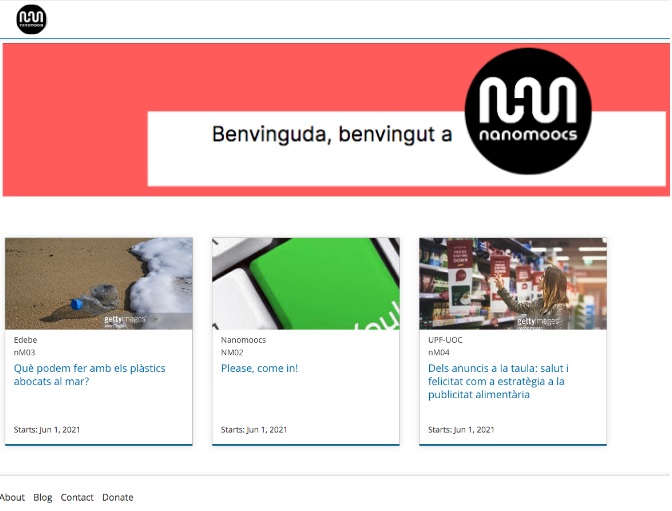NanoMOOCs present the first results to the RIS3CAT Media community
It is a new audiovisual format of digital training adopting advanced technologies that improve the quality of learning. The project envisages the creation of a platform that will centralize the available microcourses

Little more than a year ago the nanoMOOCs project got underway, and on 11 March it is to present its first results. The project combines three main areas: the instructional design of courses, the integration of technology to the nanomoocs.cat platform, and exploring business models of the new format. In these first months, three courses and six technologies have been prepared on the same platform based on open edX.
The initiative is linked to the RIS3CAT Media community and is led by UPF. It constitutes a consortium with researchers from UPF, the UOC, the University of Barcelona and the CSIC, and experts from the companies Lavinia (Next Media Project), Edebé and Grupo Ormo.
NanoMOOCs go far beyond traditional online courses and represent a new challenge for education and training that explores various markets
The first nanoMOOCs will be available from June, and will be added to on the basis of proposals received by universities and organizations that see this new format as a way to create training pills that are both targeted and effective. Therefore, during 2021, the project will open the possibility of receiving proposals for nanoMOOCs which will extend the current range on offer.
The monetization of the new format is also one of the objectives the project will be working on this year. Having certification of the courses through blockchain technologies will enable devising different business models beyond traditional ones based on payment for issuing certificates.
The first three training proposals
The analysis of environmental issues (What can we do with plastics dumped into sea?) is one of the training proposals that will soon be published and mainly targets teenagers in their last years of high school. The nanoMOOC will integrate advanced gaming technologies and skills assessment, among others, and is led by Edebé.
Helping small businesses offering a basic training nanoMOOC (Please, come in!) in English is the second proposal. The UOC, through its Modern Languages Centre, invites users to learn in a fun way how to attend to a tourist entering a restaurant or a shop in a natural, relaxed manner, providing some basic skills in English. The course will integrate emotion detection technology, as well as gaming tools that make learning more flexible.
Finally, the third proposed nanoMOOC (From adverts to the table: health and happiness as a strategy for food advertising) focuses on analysing the various tools used in advertising to reach consumers, as well as advertising discourse in relation to the nutritional properties of the product and the advertising strategy followed. The course, led by UPF, will also incorporate emotion detection technology, as well as gaming tools that make learning more flexible.
Their essence: highly specific content over a short time
NanoMOOCs come from the hybridization of Massive Open Online Courses (MOOC) that have flooded the internet for some years now and revolutionized online learning. From the early MOOCs, which were "very long and dense in content, we have learned that by shortening them and focusing on just one skill we can make the learning process more effective”, explains Miquel Oliver, project coordinator and professor with the Department of Information and Communication Technologies (DTIC) at UPF. This is the main feature of the nanoMOOC: focusing on a highly specific content (one skill) and a short time (one week).
An innovative format that includes advanced technological modules like the detector of emotions
In addition to its brief format, the nanoMOOC also includes advanced technological modules like the detector of emotions, using computer vision techniques. It also envisages blockchain certification, the application of artificial intelligence or advanced gaming, in addition to high quality content. Thus, nanoMOOCs go far beyond traditional online courses and represent a new challenge for education and training that explores various markets.
Under the project, co-funded by ACCIÓ, work will be carried out on four pilot experiences in training areas ranging from experiential tourism to nutrition and health, through small- and medium-sized businesses and STEM education or transmedia production and consumption. In fact, a call will be launched soon for the creation of nanoMOOCs by the experts of the organizations participating in the project.
It includes advanced technological modules like the detector of emotions, using computer vision techniques. It also envisages blockchain certification, the application of artificial intelligence and advanced gaming
The companies belonging to the consortium see nanoMOOCs as elements that add value to existing digital products or simply as potential new products or lines of business for exploiting. Among others, therefore, the project also aims to devise models to monetize this new audiovisual format.
The nanoMOOCs project is a part of the RIS3CAT Media Community which includes thirty-five companies, administrative bodies, technology centres and universities around the cultural and creative industries. It will be promoting eight projects up until 2023 that will deal with various fields such as artificial intelligence, data analysis, hyperpersonalization, cybersecurity and the development of new formats, among others. The implementation of the eight projects will receive a grant of 6 million euros from the Government of Catalonia, awarded through ACCIÓ.
